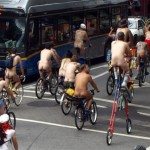Will we ever reignite the spirit of Vancouver 2010?
The sputtering effort at lighting the Olympic torch in Jack Poole Plaza last week hardly lived up to the spirit Vancouver brought to the Games eight years ago this month.
The Vancouver 2010 Winter and Paralympic Games has been analyzed for its medal wins, its sundry controversies and its cost. However, there are those who have said the Games became a rare transformative experience for the whole country — forging a new self-confidence and a boost to Canada’s reputation abroad.
But how did the Games turn into a high-fiving celebration, so powerfully embraced by the community that hosted it?
One reason was the cost of admission: free.
Back in January 2010, it is fair to say that Vancouverites had already had their fill of pre-Games warnings about traffic disruptions and other inconveniences.
Authorities were even going as far as to say the best seat for the Games was in your living room. By closing public access to the Georgia and Dunsmuir Viaducts, the City of Vancouver was symbolically pulling up the drawbridge.
“Grumpy” is how you could describe the public mood then about an event where the tickets had long been sold out, even if you could afford the $1,000-plus cost to get a family into the stands at a snowboarding or skating contest.
Global BC News Hour ran a story just weeks before the Games’ Feb. 6 start. People interviewed on the street were ambivalent at best about the event, and many were disappointed that they could not take part.
None knew, however, that there were free events happening during the Games.
Why there was no coordinated effort to promote the dozens of live sites, pavilions and other free events happening concurrently during the Games is unclear. That job fell to a pair of political bloggers who took it upon themselves to become unofficial city ambassadors by letting everyone know “Where to Be for Free.”
Before the Games, the CityCaucus.com blog run by me and Daniel Fontaine was all about local municipal politics. But after a lunch conversation with radio host Bill Good where both lamented the public’s lack of enthusiasm, Fontaine was inspired to use the blog to promote a short list of 15 free of charge venues opening just prior to the Games.
We then turned the list into a Tripadvisor-like guide where visitors could comment and rate each venue. Soon our little online guide grew to more than 50 attractions, including information on the First Nations venues and the first ever publicly-promoted Pride House.
Thanks to some advertising revenue, we were able to turn the site into a go-to source of what was happening on the street, with venue profiles and video reports posted daily.
Global BC News Hour assignment editor Clive Jackson recognized the value of the Where to Be for Free guide. The station was in tough competition with CTV, who had won exclusive rights to all the Olympic coverage. Jackson decided to promote our guide as a way to make what was happening beyond the Olympic competitions relevant to his audience.
Our website traffic went from a few hundred visitors per day to several thousand. Fontaine and I were ecstatic the day we had 25,000 visits, only to be topped days later at 50,000 daily visitors.

Then on an evening prior to the opening ceremonies, News Hour did a full report on the guide. By this time people, who only weeks before had written the Games off, were going from venue to venue carrying inkjet copies of our guide.
Our web traffic spiked to more than 150,000 that evening until the website ultimately crashed, leading me to make a panicked phone call with our web hosting provider.
After the Games, we tallied up more than 2.5 million page views over those weeks. We were overjoyed to see the free venues overflow with visitors and an electric mood on downtown streets and in nearby live sites.
Veteran Games organizers and other commentators said they had never seen the public embrace the event as much as our city did. Local reporters called it the “People’s Games.”
Vancouver’s Olympic torch may have been quickly doused, but let’s hope future leaders someday find a way to reignite the excitement we experienced here back in 2010.
Originally published in Vancouver Courier.



